By KATIE EUBANKS
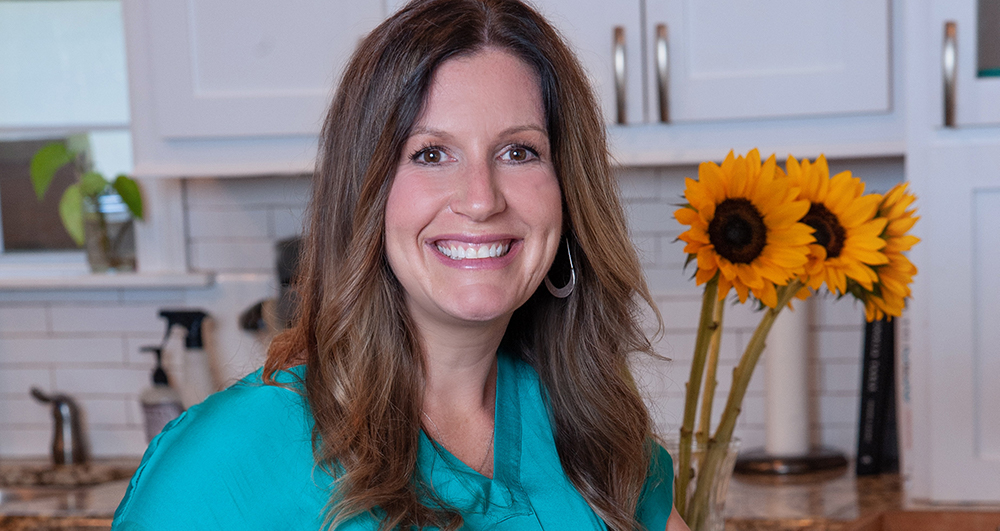
“One thing have I asked of the LORD, that will I seek after; that I may dwell in the house of the LORD all the days of my life, to behold the beauty of the LORD, and to enquire in his temple.” – Psalm 27:4, KJV.
The scripture above points to a believer’s intimate relationship with God and the eternal life we’ll experience at the end of the age. But couldn’t it also apply to a godly education?
Couldn’t education be about truth and beauty as well — not just facts and figures?
One school that aims for this is St. Augustine, a collaborative, classical Christian school located on Highland Colony Parkway in Ridgeland. The school is entering its eighth full year, with about 300 students in kindergarten through 12th grades.
Lower-school principal Dara (pronounced DARE-uh) Evans sent her kids to St. Augustine five years ago and joined the faculty last year as a first-grade teacher.
For Dara, St. Augustine is a great place to work. It’s also the latest opportunity God’s given her to be a servant leader.

Dara married Mark, who was then the Madison County Schools campus life director for Jackson Youth for Christ, in 2004.
A love of learning
Growing up in Brookhaven, Dara loved school. She got excited about school supplies. She “played school” even when she wasn’t there.
She also was the second of four daughters, so “I’m very comfortable in a support role,” she says, laughing.
Dara came to know Jesus at a young age, and came to love grammar at Alexander Junior High in Brookhaven.
“My ninth-grade English teacher, Sharon Dykes, was funny, smart, and she loved teaching. She loved books. She made me a grammar nerd. … I like the rules,” Dara says, laughing again.
One “benchmark” moment came in high school, when she was trying to decide on colleges.
“I had a couple of different options. And the Lord led me to community college before I went to Mississippi College, which I had never had a desire to do. And then that was the only option that was going to work for me. I loved it. It was a wonderful two years of college.”
After two years at Copiah-Lincoln Community College, she finished her bachelor’s in elementary education and taught fifth grade, then eighth grade, at Madison County Schools.
She met her husband, Mark, on a blind date. His boss at Jackson Youth for Christ, Gary Maze, was also on staff at Horizon Community Church, where Dara was the youth director. Gary and his wife invited Dara and Mark over, and the rest is history.

From left, Callen, Jordan and John Mason Evans.
After marrying Mark, Dara stayed home for a few years to start their family, and then returned to Madison County Schools as a literacy specialist, eventually landing at Rosa Scott High School, the ninth-grade campus of Madison Central. She and Mark’s kids also attended Madison County Schools initially, and got to learn from some great educators.
“Most of the teachers I’ve worked with got into education because they loved education, they loved children,” she notes. “At least in Madison County, those teachers are not teachers just to have a job.”
But Dara and Mark started noticing a trend:
“(When my daughter) was in second grade, and my middle son was in kindergarten … we were spending a lot of time at school. The cycle of it all revolves around school,” Dara says. “As a parent, I started to see I had less and less control over what happened with my kids those seven hours a day.”
Then a fellow parent told Dara, “We went to the neatest little informational meeting last night (about St. Augustine School).’”
Dara and Mark decided to check it out.
“At the meeting, we were sold,” she says. They moved the kids to St. Augustine.
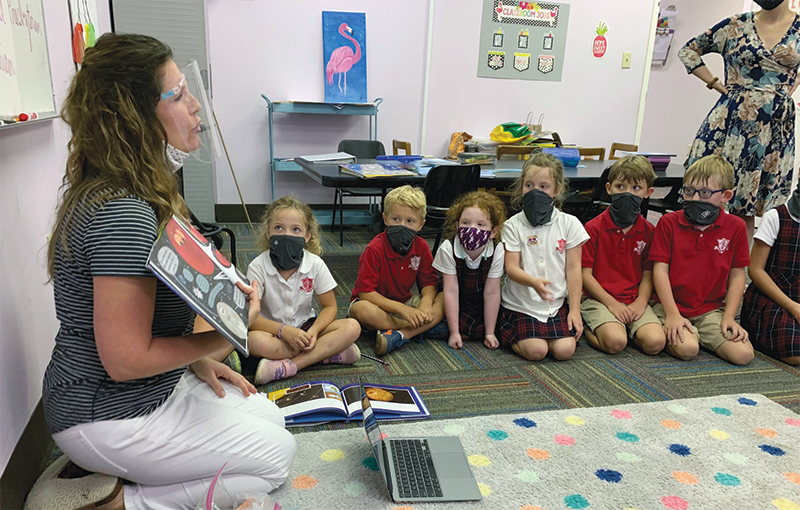
Dara reads to St Augustine students during the COVID-19 pandemic.
Excellence, wisdom and joy
It didn’t hurt that Dara and Mark knew and believed in Dave Herndon, headmaster at St. Augustine. He and Dara were in the same cohort when they got their master’s in educational leadership. Mark had completed a youth internship at Dave’s former church in Oklahoma.
Then there was the St. Augustine mission statement:
“St. Augustine School exists to cultivate excellence, wisdom, and joy by assisting parents in the education of their children, so that they may grow into a thorough understanding of God’s truth, goodness, and beauty.”
“That, to me, as kind of an idealist … I love the mission and I love that we are constantly working toward that,” Dara says. “And we’re able to do that. They’ve created a structure where we can.”
That structure includes less classroom time than a traditional school. K4 through fifth-graders are on campus two days a week, for a total of eight to 12 hours a week. The rest of the week, their parents — known as “co-teachers” in the St. Augustine lingo — take as much time as needed to teach them at home.
Older students are on campus an additional half-day and complete more online instruction, for a total of up to 18 hours of class per week in high school. Parents are still actively involved, but more responsibility is put on the student.
As a parent, “I love that we can structure our days a little differently,” Dara says. In other words, the schedule gives families more flexibility to attend church, eat meals together, and be involved in the community, instead of enduring the never-ending cycle of school, homework, dinner, sleep, repeat.
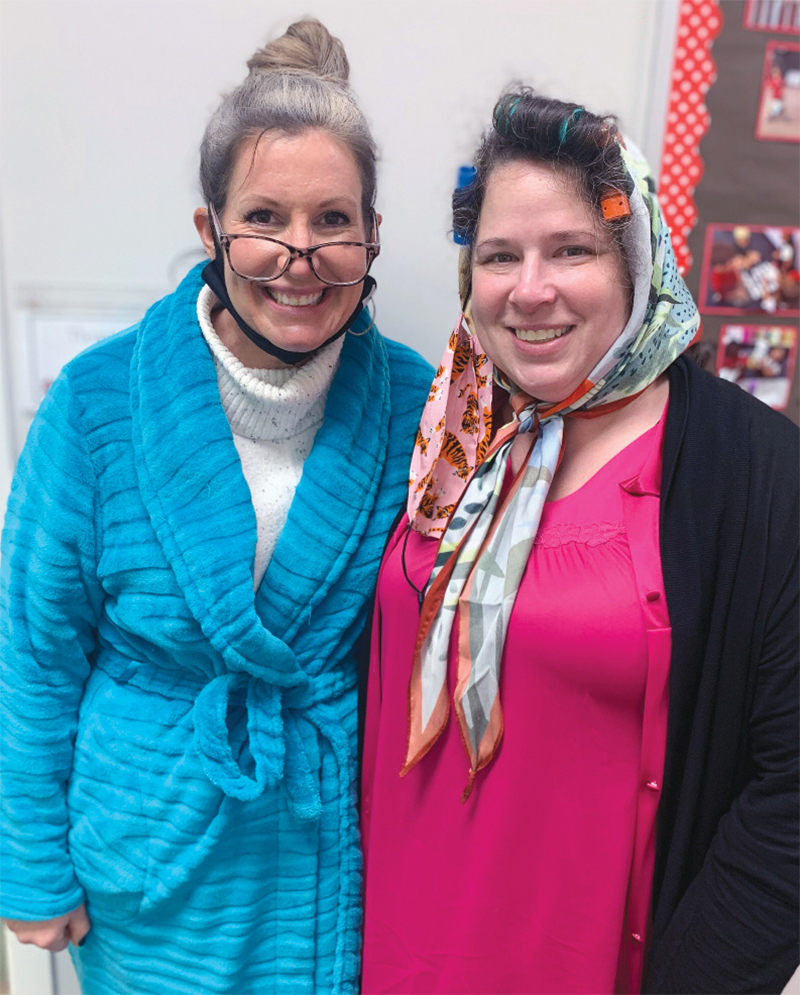
Dara with fellow first-grade teacher Ansleigh Thornhill (right), dressed up as 100-year-olds for St. Augustine’s 100th day of school this past year.
In addition to being a collaborative school, St. Augustine is also classical. What does that mean?
“Public education is all about training you for the workforce. Classical education is about teaching kids to learn, from a liberal arts foundation,” she says.
“Part of it is to unify education. And (at St. Augustine) it’s unified in the knowledge of Christ. … Part of it is teaching children to think and learn for their whole life, so they could be part of any kind of workforce. Teaching them to think and to love thinking, which could translate into any kind of career.”
She lists three phases of education at St. Augustine:
1) Grammar (elementary) — basics, rudiments and memorization.
2) Logic (middle school), in which “you start taking those elements and put logical thoughts to them, the why of it,” she says.
3) Rhetoric (high school), “which focuses on eloquence and articulation — taking these fundamentals you’ve learned, and the why, and putting it in words and learning how to communicate through writing and speaking.”
All of that sounds well and good — but what does St. Augustine teach that others don’t?
Latin, for one. Other schools might offer it as an elective, but at St. Augustine, Latin is taught “early and thoroughly.” In an essay on the St. Augustine website, provost Ann Lowrey Forster says the study of Latin “provides intellectual discipline, training in a child the ability to analyze language, an ability that will be applied in school and work for the rest of his or her life.”
St. Augustine is also all about “exposing children to beautiful things that have stood the test of time,” Dara says, such as the literal “classics” of Greek and Roman literature. And the school places more emphasis on the arts than traditional schools.
The Christ-centered aspect of St. Augustine is a bit simpler: “Because the only proper view of the world is one that acknowledges Jesus Christ as Lord, St. Augustine makes this the foundation of all its teaching,” the website states.
Ironically, Dara says, having her kids — who are now 13, 11 and 9 — surrounded by a community of very similar students from very similar Christian families took some getting used to. Mark is the discipleship and missions pastor at Broadmoor Baptist Church in Madison, and they want their kids to live on mission wherever they are. Sometimes it’s hard to do that in a Christian bubble.
“But we’re (educating them at St. Augustine) so we can launch them into all the world.”

In both parenting and educating her kids, Dara says, “There are lots of opportunities for mess-ups, and we really see His faithfulness as He has provided grace for us every step of the way.” From left: Mark, Dara, Callen in front, Jordan, and John Mason.
‘This was what I loved to do’
While her kids attended St. Augustine, Dara was enjoying “co-teaching” them at home and working part time in her literacy job at Rosa Scott.
But just about every year, she and Dave Herndon would have what she calls a “spring check-in,” she says, in which he’d ask her where she saw herself in the next few years. He wanted to hire her at St. Augustine.
“It just never seemed right. My commitment was to educate my children. I had been a teacher in the classroom, and it just takes so much out of you,” she says.
But in fall 2019, her job situation shifted a bit at Madison County, and she started asking her friends who worked at St. Augustine what their days were like.
“Through all that … and just my time with the Lord, I just realized that, at some point before motherhood, this was what I loved to do. I loved curriculum, I loved the rapport between teachers and students. I wanted to go back (to the classroom).”
So for the 2020-21 school year, she taught first grade at St. Augustine and was the testing coordinator and after-care director.
“It was all the wonderful things I remembered about teaching, and none of the bad things,” Dara says. “I was in my 40s and a step ahead of some of these parents in their 20s and 30s, and I was able to help them. … I put my whole heart into what I was doing, which was easy because I loved it.”
But she also had a desire to step into a more administrative position. At Madison County Schools, “I got to speak into some of the things that were going on,” she says. “That’s the whole reason I got the master’s in educational leadership.”
As St. Augustine grew and the need arose for principals — one for the lower school and one for the upper — “it sounded like an opportunity for servant leadership,” Dara says. She admits she thought she’d be teaching longer, but she’s excited to begin the school year in her new role as lower-school principal.
“It sounds really fun to me, and a good fit for the experiences I’ve had the past few years.”
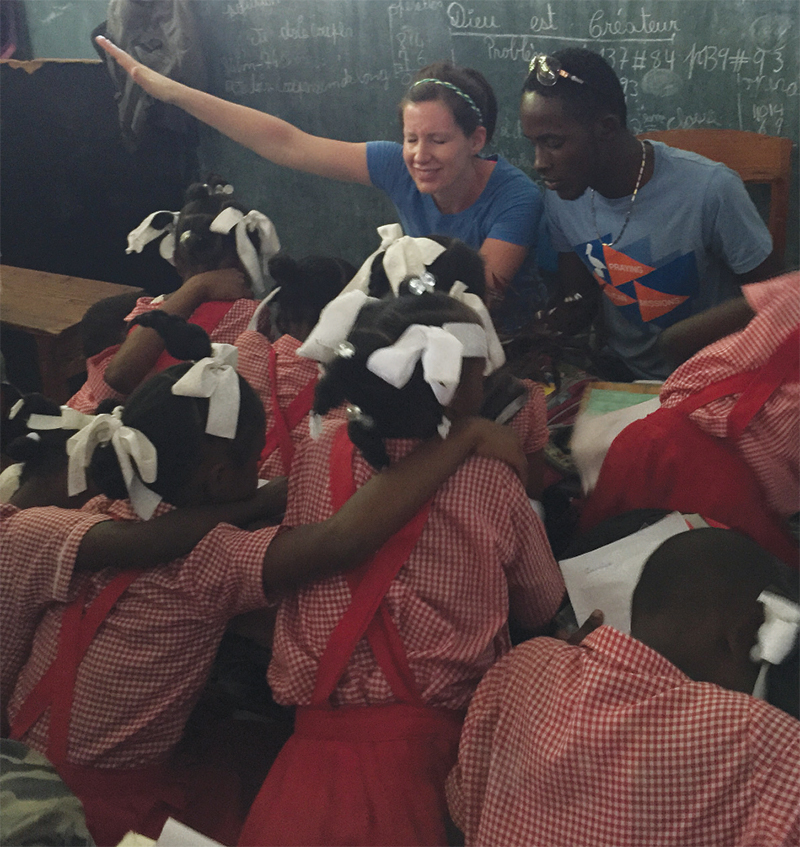
Dara praying in Haiti during a mission trip.
Relieving pressure, growing faith
Today’s educational landscape can often feel like a minefield for parents, teachers and students.
Teachers feel pressure “from all sides,” Dara says, including administration, parents and students.
“I think it’s unrealistic, some of the expectations we put on teachers,” she says. “You get into the job, and all the reasons that you got into education, it’s hard to remember them in the day to day, when you’re dealing with discipline issues and school protocols and administrative pressures.
“In addition to just addressing all the social issues. The world is changing. For those of us who are believers to still hold to our faith and then also to love students is increasingly difficult.”
One way St. Augustine relieves that pressure is simply by being committed to Christ, she says.
“We don’t have the pressure of, ‘Can we hold to our faith and teach what we’re supposed to teach?’ They are one and the same.”
School leadership also tries to keep their expectations for teachers “in check,” meaning that standards are high, but “(we) make allowances for teacher differences and student differences, and allow leeway for the Holy Spirit to lead teachers in how they should deal with their students,” Dara says. “Just recognizing that this is their calling and their ministry also.”
Students, of course, don’t have it easy in 2021 either:
“There’s a cultural pressure in school that is hard. And the pressure we put on (students) to be excellent,” Dara says. “(There’s a pressure) to be able to take on an adult-type schedule in a world where parents are busy with their own thing … not to seem too studious, and to fit in (with friends) … but still get the grades your parents expect.”
Having parents more in the mix at St. Augustine as co-teachers, especially in the younger years, helps a lot, she says. “You’ve got your primary influences (parents and teachers) working together.”
The cellphone locker at St. Augustine also helps. Students put their phones away upon arrival and don’t get them out until the end of the day. (The very image of a teenager lasting multiple hours without a smartphone ought to be enough to strengthen anyone’s faith.)
While St. Augustine does expect more of parents as co-teachers, they also have more time and freedom to meet those expectations.
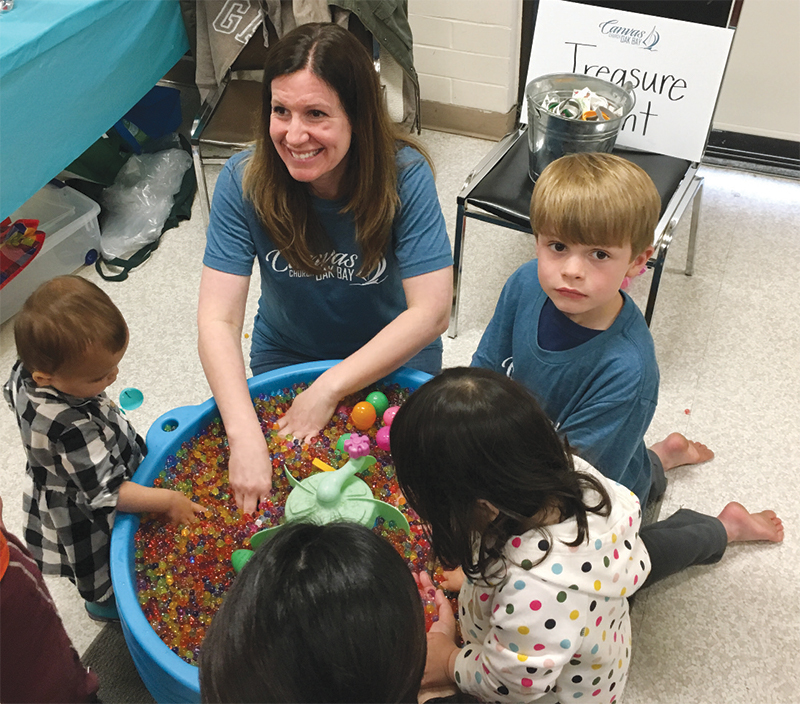
Dara with her son Callen (looking at camera), digging for prizes at a block party for Canvas Church in Victoria, British Columbia, during a mission trip to Canada.
When the Evans kids were at Madison County Schools, “we only had a second grader and a kindergartener, and the school schedule was dictating our life,” Dara says. “That time was being taken away at a very early age. And we knew it was not going to get better. They were not going to get less involved (in school).”
That’s part of why the collaborative model appealed to her and Mark so much: They could have more time away from school, but without the burden of totally homeschooling the kids. They could breathe, but they still had a school community.
The St. Augustine community has also grown Dara’s faith, both as an educator and as a parent.
“In this school, it feels like these parents have entrusted you with a huge part of discipling their kids,” she says.
At home, as a co-teacher for her kids, “you see lots of good and bad about your children, and about yourself,” she says, laughing. “There are lots of opportunities for mess-ups, and we really see His faithfulness as He has provided grace for us every step of the way, and then as we also have been able to offer that to our children.”
She also appreciates the close partnership with her kids’ teachers, who are there for more than just academic instruction: “They’re not comparing my kids to every kid in the county. They’re holding my kids up to God’s Word,” she says.
No school is perfect, of course. “The Bible does not command a specific method or model of education,” Forster’s essay says. “(We) do not believe there is one right way for Christians to educate their children, nor is there one right school to attend in central Mississippi.”
Any type of education will have its own foibles and flaws. Teaching is hard in any setting. So is parenting. So is being a student.
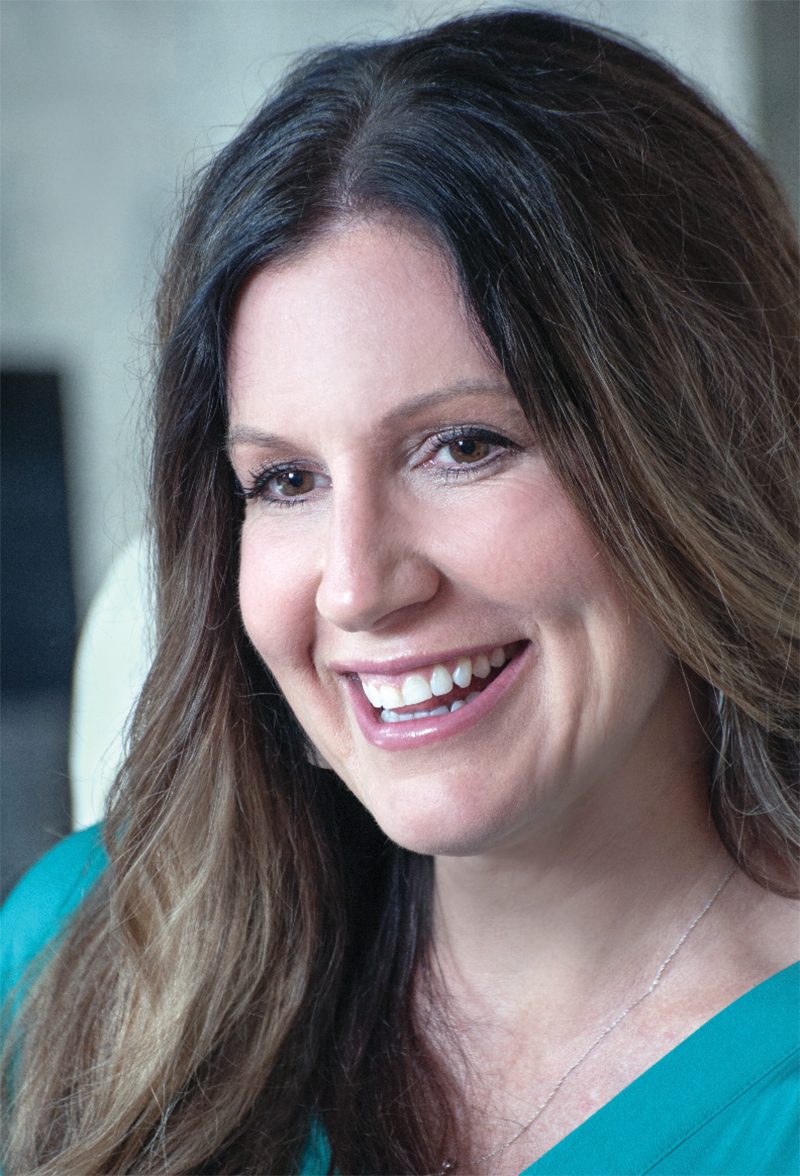
What about being an administrator?
Dara admits that, normally, “I don’t tell adults what to do.” But as a principal, “there will be some of that. Dave Herndon has said, ‘There will be times you’ll have to be the bad guy,’ and I’m preparing myself for that.”
Mostly, though, she sees her role as “support(ing) parents, faculty, and student relationships, facilitating those relationships” — and she believes that’s exactly where God has led her.
“When I look back over the course of my life in education — I think I could cry about this if I thought about it … I’m not an extremely planned-out person, or ‘Here’s where I plan to be in 10 years’ … (but) His hand has guided me, every little step.”

